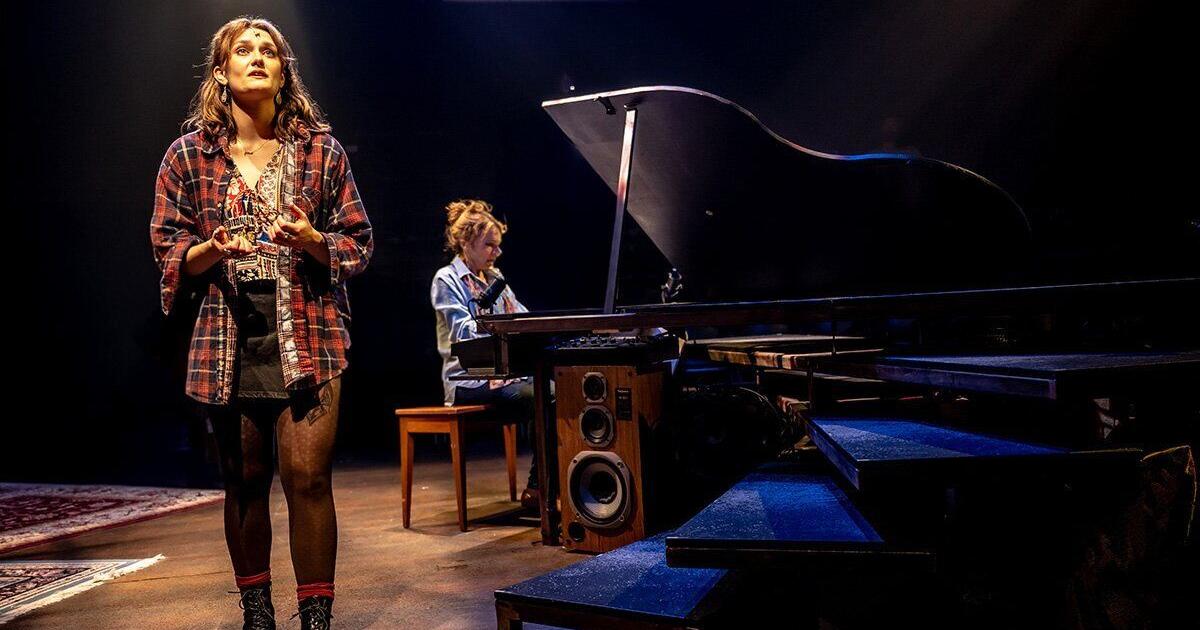When “After the Rain” breaks into song, it strikes gold. Nay, perhaps even platinum.
That’s not altogether surprising. After all, this new musical, which opened Wednesday at Tarragon Theatre, is about a fictional, “Canada famous” band, the Evans Stone. And its folk-rock score is written by none other than Suzy Wilde, one of Toronto’s most talented yet underrated composers, who’s already made a mark with shows like “Be Kind, Rewind” and “The Carrette Sisters.”
Unfortunately, the rest of “After the Rain” isn’t nearly as sterling — hampered by Rose Napoli’s awkward book and some ineffectual direction by Marie Farsi.
The musical’s story, inspired by true events (its lead character is based on Wilde herself), recalls other shows in the small but growing genre of fictional bands. Its behind-the-scenes drama is reminiscent of the acclaimed Broadway play “Stereophonic,” about a rock group on the cusp of superstardom. And its sweet, coming-of-age tale mines similar thematic territory as the 2016 film “Sing Street.”
But the intimate narrative of “After the Rain” remains frustratingly hazy, never managing to emerge from the shadow of Wilde’s galvanizing music.
At its centre is Suzie (Annika Tupper), the 20-something daughter of Ashley Evans (Andrew Penner) and Jean Stone (Deborah Hay), the two core members of the Evans Stone band.
The trio aren’t necessarily a dysfunctional family, but a sense of dysfunctional ennui permeates their lives. As they prepare to head out on a new tour, Ashley and Jean are at loggerheads about how they can replicate the band’s success from the ‘90s. Ashley wants to stick with what’s tried and true; Jean feels their only path forward is to write new songs and innovate.
Meanwhile, Suzie, who narrates the show, doesn’t know where she belongs — or if that’s even in the band. But she finds clarity when she unexpectedly agrees to take on one of her father’s piano students, Jean (also played by Hay), a complete beginner who only wants to master one song: Erik Satie’s wistful “Gymnopédie No. 1.”
Wilde’s songs do much of the heavy lifting throughout the musical. Many are full-fledged bangers — with rousing choruses, soaring harmonies and virtuosic instrumentals. (Can we get a cast recording, please?)
Her lyrics are startling as well. Deeply suggestive, they set the mood for the rest of the show, hinting at the melancholy, hope and frustration of each of the characters.
The music in “After the Rain,” however, is unlike that of a traditional musical, in which spoken dialogue seamlessly transitions into song, with the characters unaware that they’re singing.
Here, the score is almost entirely diegetic, originating within the world of the show. The numbers are meant to be songs that the characters have written. They’re mostly performed by the band in concert or in rehearsal — and when they’re sung, there’s a sense of self-awareness.
In that way, “After the Rain” could be considered more of a play with music than a standard musical, because the songs can’t completely probe the inner thoughts and emotions of each character. Instead, it’s up to the dialogue to do that.
But Napoli’s book scenes, linking the musical numbers together, aren’t up to that task and largely disappoint. While she does a compelling job early on of establishing the high strung atmosphere in the band’s rehearsal room, it comes at the expense of developing the musical’s characters, along with the key conflicts among them.
The tension in the first act almost entirely hinges on the reveal of why Jean only wants to learn one song. Other supporting characters (such as the rest of the band members, played by Joe “Jojo” Bowden on drums and Brandon McGibbon on bass guitar) are introduced then entirely forgotten. Suzie, too, remains an indistinct protagonist.
The second half of “After the Rain” is the stronger act. But still, important emotional beats rarely land with the impact that they could have, because they lack the necessary foregrounding earlier in the musical. By far the most underdeveloped relationship: the one between Suzie and her mother.
What’s not in short supply in this show, however, is audience participation. (If you’re sitting anywhere in the first row: beware.) But all of it, though charming at first, feels misplaced, and mostly distracts from the story.
Farsi’s direction also mostly misses. She’s completely transformed the Tarragon Theatre Mainspace for this production. Gone is the normal proscenium setting. In its place is a traverse stage, with the audience sitting on opposite sides of the action.
David Boechler’s set features a raised platform at its centre, which neatly transforms into a grand piano when the action shifts to Jean’s home.
It’s an innovative setup, but also results in some cumbersome staging. Particularly when there’s only one character on that raised platform, Farsi has them constantly turning back and forth between the two sets of audiences.
The cast make the most of their underwritten roles. Tupper possesses a shimmering voice; Hay accentuates the contrasts between her two characters; and Penner, with his distinctively husky voice and a chain necklace around his neck (the costumes are by Ming Wong), leans into Ashley’s full rocker persona.
But together, when they sing, the music-making is glorious. Close your eyes, and you’ll be transported.



